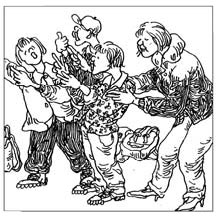The Ministry of Education's plan to introduce, on a trial basis, Peking Opera into the arts curricula of primary and middle schools in 10 metropolises and provinces has aroused heated debate among netizens and the media since it was reported last week.

The debate revolves around a variety of issues. Some people have asked whether the ministry should be going so far as to list 15 specific Peking arias for the experimental classes. It already has much more important tasks at hand, such as to draft policies, the need to carry out further education reforms and its obligation to see to it that every child has access to compulsory education. Others ask if Peking Opera should be the only traditional opera style covered by the music classes.
Still others doubt whether music teachers today are up to the task of teaching the art.
I believe all the arguments have their merits.
There is no doubt that introducing Peking Opera into the schools' music courses on a trial basis is laudable. After all, Peking Opera, which originated more than 200 years ago, is a popular but refined operatic art that won international recognition early in the last century as the national opera of China.
However, I think the teachers should be given a wider choice of arias or even melodies for the experimental classes. The list of the 15 titles is too short, not to mention the fact that eight of them are modern arias that represent developments of the past 59 years. Two on the modern bill are even new to the ears of people like me, who grew up during the "cultural revolution" (1966-76), when the only theater plays were eight modern Peking Opera dramas.

It was only after China started reforms and opening up that I began to learn that China's music heritage goes beyond Peking Opera. It was only after I joined China Daily that I was able to brush up my understanding of how a folk opera troupe from Anhui came to Beijing more than 200 years ago to integrate the best of the Kunqu Opera into their own folk melodies to develop a Peking Opera. In fact, great Peking Opera artists all studied the Kunqu Opera to refine their skills.
I do not think it would do justice to Peking Opera if no Kunqu Opera arias were included.
While we recognize the unique place Peking Opera occupies in the hall of fame of China's traditional performing arts, we should not be oblivious to the fact that there are more than 300 styles of folk opera in China, whose diversity has enriched our cultural heritage and our lives. The many folk opera styles out there, such as the mellow and beautiful Yueju and Huangmei operas in East China or the forceful and dialectically rhythmic Yueju Opera in Guangdong and Hong Kong, demand recognition.
I hope the reports that this new program is limited to Peking Opera are wrong. I also hope that teachers will be more creative in teaching the courses so their students come to know the masterpieces of not only Peking Opera, but also the best local arts. It would also be interesting for students to hear the differences between the voice of Peking Opera master Mei Lanfang and that of Luciano Pavarotti.
Above all, I hope the ministry as well as local education bureaux do not rush things, but take into account the difficulties in managing even the experimental classes. It is clear that most music teachers today have not received proper training to teach even the set of arias they have been given. It will take a lot of work and imagination to really get the classes going.
E-mail: lixing@chinadaily.com.cn
(China Daily 02/28/2008 page8)

